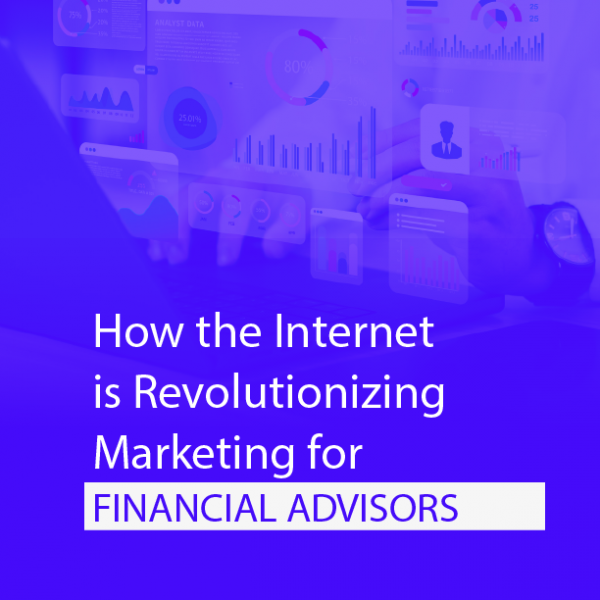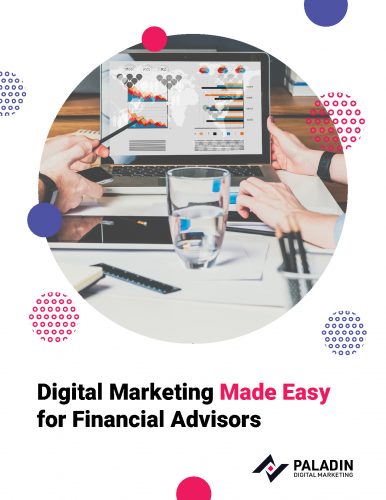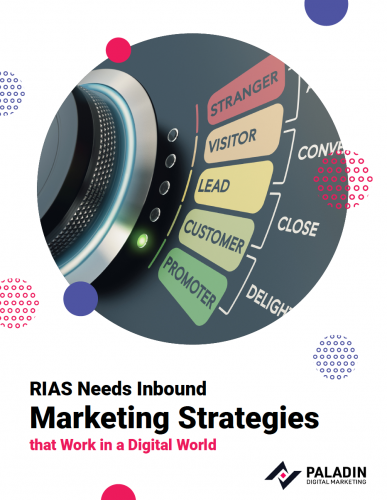How the Internet is Revolutionizing Marketing for Financial Advisors!

Financial advisor marketing has undergone a dramatic transformation over the past two decades. Traditional outbound marketing dominated the scene for decades, with advisors controlling the flow of information to potential clients through advertisements, cold calls, and mailers. This approach placed financial advisors firmly in the driver’s seat, by controlling the data that investors used to make their selection decisions. However, the prolific use of the internet has revolutionized this dynamic, paving the way for inbound marketing strategies that are more transparent and interactive.
In today’s digital age, it is unrealistic to assume that investors won’t leverage the internet to find, evaluate, and contact financial advisors. The ease of access to information online means that investors are more informed and empowered than ever before. They can research advisors, compare services, and read reviews at the click of a button, fundamentally shifting the balance of power from advisors to investors.
The internet has not only made inbound marketing (investors initiate contact with advisors) possible, it has also transformed seeking advisors online into a data-driven process that is characterized by mutual exchanges of information.
Financial advisors must now engage with potential clients through content marketing, social media, and other online channels, providing valuable insights and building trust long before any direct contact is made. This shift has required advisors to adopt new strategies and tools to stay relevant and competitive.
Digital interactions are now the norm and financial advisors must embrace this reality to be successful. Ignoring the internet’s role in the investor’s decision-making process is not an option. By harnessing the power of digital marketing, advisors can reach a broader audience, engage more effectively with prospects, and ultimately drive business growth.
Like many other industries, the internet is a game changer that has significantly altered how financial advisors market their services, presenting both new opportunities and new challenges. This article will explore these changes in depth, offering insights into how advisors can navigate the evolving digital landscape to maximize their marketing results.
Investors have access to vast amounts of data about financial advisors!

In today's digital age, investors are empowered like never before with vast amounts of data at their fingertips. The Internet has revolutionized how they access information about financial advisors, making it easier to conduct thorough research from the comfort of their homes.
With 82% of investors visiting financial advisor websites and 64% conducting Google searches on advisor names, the initial online impression becomes a critical factor in their decision-making processes. Plus, investors can remain anonymous while gathering this information, giving them the freedom to explore their options without any sales pressure from advisors.
The power of the Internet extends far beyond just providing information; it has transformed marketing for financial advisors based on inbound marketing principles. Advisors can now attract potential clients by creating valuable blog content and eBooks that address investors' questions and concerns. And, by optimizing their online presence, financial advisors can effectively engage with their target audiences, while building credibility and trust. This approach not only draws investors in but also positions advisors as credible sources of high-quality financial guidance.
Ultimately, what investors find on the Internet significantly influences their choices of whom to contact for interviews. A well-crafted digital presence can set an advisor apart from competitors, showcasing their unique value proposition and fostering a sense of trustworthiness. From the quality of the website to the transparency of information provided, every detail counts. As investors navigate through numerous options, those advisors who present themselves effectively online will have a distinct advantage in capturing and converting interest into meaningful client relationships.
Why is withholding information on financial advisor websites a risky proposition?
Withholding information on financial advisor websites is a risky proposition for several reasons.
With the vast amount of information available online, investors are becoming more educated and discerning. They frequently visit multiple financial advisor websites to compare offerings, credentials, and transparency. When a financial advisor withholds information, it raises red flags for these educated investors, making them question what else might be hidden.
Transparency is crucial in building trust and credibility. Financial advisors who are open and forthcoming with information are more likely to be trusted by potential clients. Conversely, withholding information can create a perception of dishonesty or lack of transparency, which can be detrimental to building trustworthy, advisor-client relationships.
In a competitive market, advisors who are transparent about their services, fees, and expertise are more likely to attract and retain clients. Advisors who withhold information risk being overlooked in favor of more transparent competitors. This competitive disadvantage can result in lost opportunities and reduced new client acquisitions.
Cautious investors may also assume that withheld information is being hidden because it is negative or unfavorable. This assumption can lead them to exclude such advisors from their consideration, opting instead for those who are more forthcoming with the information they are seeking.
Financial advisors are subject to various regulations that require certain disclosures. Failing to provide the required information can lead to regulatory penalties and damage to the advisor's reputation. Ensuring full compliance with regulatory requirements is essential to avoid legal and financial repercussions.
In summary, withholding information on financial advisor websites undermines trust, diminishes credibility, and places advisors at a competitive disadvantage. As investors become more knowledgeable and cautious, transparency becomes a key differentiator that can significantly impact an advisor's success.
What are the top six benefits when financial advisors embrace digital marketing and use it to reach investors on the Internet?
Expanded Reach and Accessibility
The internet has revolutionized the way financial advisors can reach and connect with clients, dramatically expanding their potential audience. Unlike traditional marketing methods that are often confined to local areas, the internet allows advisors to reach potential clients across the globe.
Social media platforms such as LinkedIn, Facebook, and X provide powerful tools for financial advisors to share insights, offer advice, and engage with diverse audiences. Websites serve as 24/7 storefronts where potential clients can learn about services, read testimonials, and schedule appointments. Online advertising, through tools like Google Ads and Facebook Ads, can target specific demographics, interests, and behaviors, ensuring that the right message reaches the right people.
The impact of this expanded reach is profound. Advisors are no longer limited by geographical constraints, enabling them to connect with clients from different cities, states, or even countries. This not only increases the number of potential clients but also diversifies the advisor's client base, which can be beneficial for growth and stability. For example, an advisor in a small town can now attract high-net-worth individuals from metropolitan areas or even international clients seeking specialized expertise. This broader reach also means that advisors can build niche markets and become known for specific financial planning specialties, such as retirement planning for expatriates or wealth management for tech entrepreneurs.
Accessibility is another critical factor that the internet enhances for financial advisors. With a well-designed website, clients can access information about financial planning services at any time, from anywhere. This convenience can significantly increase client engagement and satisfaction.
Potential clients who may have been hesitant to walk into an office can now explore services anonymously and at their own pace, which can lead to higher conversion rates. Moreover, tools like video conferencing and online scheduling make it easier for advisors to conduct meetings with clients regardless of location, further reducing barriers to engagement. In essence, the internet doesn't just expand the reach of financial advisors—it makes their services more accessible and appealing, driving business growth in unprecedented ways.
Enhanced Personalization and Targeting

Enhanced personalization and targeting have revolutionized the marketing landscape for financial advisors, offering unprecedented opportunities to connect with potential clients. At the heart of this transformation is the use of data analytics and Customer Relationship Management (CRM) systems. These tools allow advisors to gather and analyze vast amounts of data about client behaviors, preferences, and needs. By leveraging this information, advisors can segment their audiences more effectively, ensuring that their marketing efforts are not just broad strokes but finely tuned messages that resonate with specific groups of potential clients.
The development of personalized marketing strategies has become more accessible and sophisticated with the advent of online tools. Financial advisors can utilize email marketing platforms, social media analytics, and automated marketing systems to tailor their communications. For example, an advisor might send different content to a young professional just starting to invest versus a retiree looking to transition from work to retirement. This level of customization ensures that each client receives relevant, timely, and valuable information, making them more likely to engage with the advisor's services.
The benefits of personalized communication extend beyond just attracting new clients; they play a crucial role in building stronger, long-lasting relationships with current clients. Plus, when clients feel understood and valued, their trust in their advisor deepens.
Personalized messages that address clients' specific concerns and goals demonstrate that the advisor is attentive and invested in their success. This trust not only enhances client satisfaction and loyalty but also encourages clients to refer others to the advisor, creating a virtual cycle of growth and engagement for the financial advisors’ practices.
Content Marketing and Education

Content marketing plays a crucial role in establishing authority and trust for financial advisors. By consistently providing valuable and informative content, advisors can position themselves as experts in their field, gaining the confidence of potential clients. This strategy not only helps in building a strong online presence but also fosters long-term relationships based on credibility and reliability.
When advisors share their insights through well-crafted articles, blogs, and social media posts, they demonstrate their knowledge and commitment to helping clients navigate the complexities of financial planning and investing. This, in turn, can lead to increased client loyalty and a competitive edge in the marketplace.
Educational content such as blogs, webinars, and e-books offer financial advisors a unique opportunity to engage with their audiences on a deeper level. For instance, a series of blog posts covering topics like retirement planning, investment strategies, or tax-saving tips can provide immense value to readers seeking guidance.
Webinars can offer an interactive platform for advisors to showcase their expertise and address real-time queries from potential clients. E-books, on the other hand, can serve as comprehensive guides that establish the advisor as a thought leader. By educating their audiences, advisors not only attract more prospects but also nurture trust and build a solid foundation for future business relationships.
Search Engine Optimization (SEO) can also play a pivotal role in driving traffic to the educational content produced by financial advisors. By optimizing their content for relevant keywords and phrases, advisors can enhance their visibility on search engines, making it easier for potential clients to find them.
This increased visibility not only attracts more visitors but also establishes the advisor’s website as a credible source of information. When investors come across well-ranked, informative content, it reinforces the advisor’s authority and trustworthiness. In an industry where trust is paramount, leveraging SEO to boost content visibility can provide a significant competitive advantage, ultimately leading to higher client acquisition and retention rates.
Social Media Engagement
In today's digital landscape, social media platforms like LinkedIn, X (formerly Twitter), and Facebook have become essential tools for financial advisors to engage with current and potential clients. LinkedIn, in particular, stands out as a professional network where advisors can share insights, industry news, and personal achievements, thereby establishing credibility and thought leadership.
X allows for real-time engagement and quick sharing of market updates, fostering an interactive environment. Facebook provides a more personal touch, allowing advisors to connect with clients on a more relatable level through updates, photos, and videos. By leveraging these platforms effectively, advisors can expand their reach and enhance their visibility in a very competitive marketplace.
Engaging with audiences on social media requires a strategic approach. Financial advisors should focus on creating and sharing content that resonates with their target audiences. This includes educational posts, market analysis, client success stories, and interactive content such as polls, quizzes, and Q&A sessions.
Consistency is key; maintaining a regular posting schedule ensures that the advisor remains top-of-mind for their followers. Additionally, responding promptly to comments and messages helps build trust and foster a sense of community. Utilizing social media analytics can provide valuable insights into what types of content perform best, allowing advisors to refine their strategies over time.
Several case studies highlight the power of social media engagement in the financial sector. For example, one advisory firm saw a significant increase in client acquisition after launching a series of educational webinars promoted through LinkedIn and X. By sharing snippets of these webinars and engaging with viewers in the comments, they were able to demonstrate their expertise and attract new clients.
Another firm successfully used Facebook to humanize their brand by posting behind-the-scenes content and client testimonials, which resulted in higher engagement rates and client loyalty. These examples underscore the importance of a well-thought-out social media strategy in achieving marketing success and building lasting relationships with clients.
Online Reviews and Reputation Management

In the digital age, online reviews and reputation management have become pivotal in shaping potential clients' perceptions and decisions. For financial advisors, positive reviews can significantly enhance credibility and attract new clients, while negative reviews can deter potential leads.
Investors frequently look for advisors with a strong online presence and favorable feedback, as these reviews provide insights into the advisor's reliability, expertise, and client satisfaction. Therefore, maintaining a positive online reputation is crucial for success in the competitive financial advisory landscape.
To effectively manage and respond to online reviews, financial advisors should adopt best practices that ensure transparency and professionalism. Responding promptly and courteously to reviews, whether positive or negative, demonstrates a commitment to client satisfaction and openness to feedback. For negative reviews, it's important to address the concerns raised without being defensive, offering solutions or ways to rectify the issues. This approach not only mitigates the impact of negative feedback but also shows prospective clients that the advisor values their clients' experiences and is dedicated to continuous improvement.
Several tools and platforms can assist financial advisors in monitoring and enhancing their online reputation. Google Alerts and social media listening tools, such as Hootsuite and Sprout Social, allow advisors to stay informed about mentions and reviews across various channels. Review management platforms like Trustpilot and Reputation.com offer more comprehensive solutions for collecting, managing, and showcasing client feedback. By leveraging these tools, financial advisors can maintain a proactive stance in managing their online reputation, ultimately fostering trust and attracting a broader client base.
Virtual Consultations and Client Communication

Virtual consultations and client communication have undergone a significant transformation with the advent of video conferencing tools. As technology has advanced, financial advisors have embraced platforms like Zoom, Microsoft Teams, and Google Meet to connect with clients remotely. This shift not only ensures continuity in service delivery during times when in-person meetings are not feasible but also expands the reach of advisors to clients who may be geographically distant.
The convenience of scheduling and the reduction in travel time have made virtual consultations a preferred mode of interaction for many financial advisors and their clients.
The benefits of remote communication are multifaceted, enhancing both the advisor's and the client's experience. For advisors, virtual meetings allow for greater flexibility and the ability to meet with more clients in a day. It also provides an opportunity to offer more personalized service, as advisors can share screens, documents, and presentations seamlessly during the call.
For clients, the ease of connecting from the comfort of their home or office removes barriers to regular communication, fostering a more consistent and engaged relationship with their advisors. This accessibility can lead to more timely advice and quicker decision-making, which is crucial in the fast-paced world of financial markets.
Effectively conducting and managing virtual client meetings requires a blend of technological proficiency and interpersonal skills. Advisors need to ensure they are familiar with the tools they are using, from basic functions like screen sharing and recording to more advanced features like virtual whiteboards and breakout rooms.
It's also essential to maintain a professional and organized environment, minimizing distractions and ensuring privacy. Clear communication and setting expectations beforehand can help make virtual meetings as productive as face-to-face interactions. By prioritizing a client-centric approach and leveraging the full capabilities of video conferencing tools, financial advisors can continue to provide exceptional service and build strong, lasting relationships with their clients.
Next Step…..
The internet has fundamentally reshaped how financial advisors approach marketing. Traditional methods, such as networking events and printed advertisements, have given way to digital strategies that offer far greater reach and precision. Websites, social media platforms, email marketing, and search engine optimization (SEO) now form the backbone of a modern advisor's marketing toolkit.
These tools enable advisors to connect with potential clients more effectively, providing educational content, personalized advice, and streamlined communication channels. By leveraging data analytics, advisors can gain deeper insights into client behavior, tailor their marketing efforts to specific demographics, and ultimately increase their conversion rates.
Staying current with digital marketing trends is crucial in this fast-evolving environment. Technologies such as artificial intelligence, automation, and personalized content delivery are becoming increasingly sophisticated, offering new ways to engage with clients and prospects. Financial advisors must continuously adapt their strategies to incorporate these innovations, ensuring they remain competitive and relevant.
Furthermore, understanding the regulatory environment and maintaining compliance in digital communications is essential to building trust and avoiding potential pitfalls. Advisors who stay ahead of the curve can leverage these trends to not only attract new clients but also to enhance the overall client experience and foster long-term relationships.
Choosing a digital marketing agency that specializes in working with financial advisors in a regulated industry offers numerous advantages. Such agencies have a deep understanding of the unique challenges and opportunities within the financial sector, including the stringent compliance requirements that advisors must navigate.
This expertise ensures that marketing campaigns are not only effective but also adhere to all relevant regulations, thereby minimizing risk and enhancing the advisor's credibility. Additionally, specialized agencies are well-versed in the best practices for engaging with both current and prospective clients, leveraging industry-specific knowledge to create tailored strategies that resonate with the target audience.
Moreover, a specialized agency brings a wealth of experience and proven success in the financial advisory space. They understand the nuances of investor behavior, the competitive landscape, and the most effective channels for reaching potential clients. By partnering with an agency that has a track record of success in this field, financial advisors can benefit from insights and strategies that have been refined through years of industry-specific work. This collaboration not only maximizes marketing ROI but also frees up advisors to focus on their core competencies. That is providing exceptional financial advice and services to their clients.
Updated 10/16/2021




